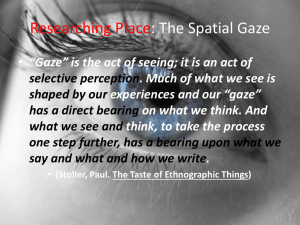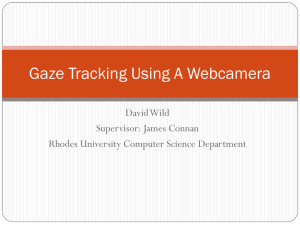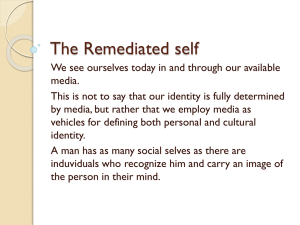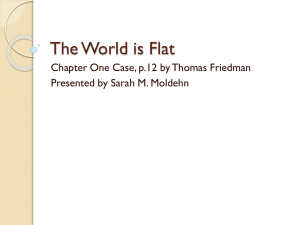Week 8 Lecture 2 The Gaze
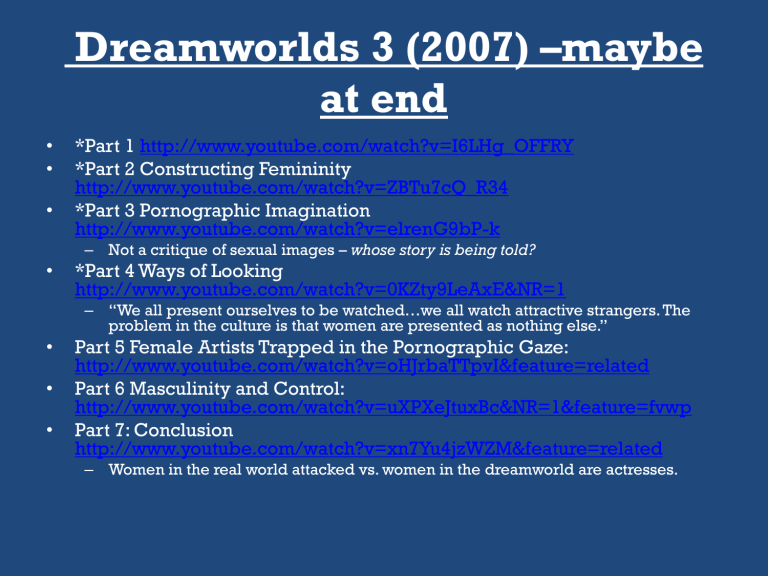
Dreamworlds 3 (2007) –maybe at end
• *Part 1 http://www.youtube.com/watch?v=I6LHg_OFFRY
• *Part 2 Constructing Femininity http://www.youtube.com/watch?v=ZBTu7cQ_R34
• *Part 3 Pornographic Imagination http://www.youtube.com/watch?v=elrenG9bP-k
– Not a critique of sexual images – whose story is being told?
• *Part 4 Ways of Looking http://www.youtube.com/watch?v=0KZty9LeAxE&NR=1
– “We all present ourselves to be watched…we all watch attractive strangers. The problem in the culture is that women are presented as nothing else.”
• Part 5 Female Artists Trapped in the Pornographic Gaze: http://www.youtube.com/watch?v=oHJrbaTTpvI&feature=related
• Part 6 Masculinity and Control: http://www.youtube.com/watch?v=uXPXeJtuxBc&NR=1&feature=fvwp
• Part 7: Conclusion http://www.youtube.com/watch?v=xn7Yu4jzWZM&feature=related
– Women in the real world attacked vs. women in the dreamworld are actresses.
Week 8 Lecture 2: Gender and Media
The Gaze &
Media and Male Identity
• (Continue) understanding media through the framework of gender.
• Today we focus on the idea of “the gaze” and also
• How is masculinity constructed through the media?
The Gaze aka The Look
• Terminology originally from film studies.
• Now applied throughout Media Studies.
• Refers to TWO concepts.
– 1. How the audience looks at a media text.
– 2. How people within a media text look at eachother.
Who looks at who?
• When you were small did you ever think that the person on
TV could see you?
• “a genuine exchange of gazes through the textual frame is of course not possible - the viewer can look at those depicted in the text and cannot be seen by them - giving the viewing of all mass media texts and ‘realistic’ figurative art a voyeuristic aspect.”
• Voyeurism refers to watching someone without them knowing you are watching…
Daniel Chandler. Nates on the Gaze. http://www.aber.ac.uk/media/Documents/gaze/gaze02.html
. Accessed 27
February 2011.
Who looks at who – types of gaze?
• “the spectator’s gaze: the gaze of the viewer at an image of a person (or animal, or object) in the text;
• the intra-diegetic gaze: a gaze of one depicted person at another (or at an animal or an object) within the world of the text (typically depicted in filmic and televisual media by a subjective ‘point-of-view shot’);
• the direct [or extra-diegetic] address to the viewer: the gaze of a person (or quasi-human being) depicted in the text looking ‘out of the frame’ as if at the viewer, with associated gestures and postures (in some genres, direct address is studiously avoided);
• the look of the camera - the way that the camera itself appears to look at the people (or animals or objects) depicted; less metaphorically, the gaze of the film-maker or photographer.”
Daniel Chandler. Nates on the Gaze. http://www.aber.ac.uk/media/Documents/gaze/gaze02.html
. Accessed 27
February 2011.
Spectators Gaze
Intra-Diagetic Gaze
• Diagetic just means “within the film world”
Extra-diagetic gaze
• Is the same as “direct address”…
Direct Address
• a gaze of direct
address which represents a demand for the viewer (as the object of the look) to enter into a parasocial relationship with the depicted person
• It is as if she is talking to us!
(Kress & van Leeuwen
1996, 122ff)
Daniel Chandler. Nates on the Gaze. http://www.aber.ac.uk/media/Documents/gaze/gaze02.html
. Accessed 27
February 2011.
Indirect Address
• an indirect address which …viewer is an invisible onlooker and the depicted person is the object of the look …act as if they do not know (as in feature films, television drama and television interviews);
• Since other examples will be from fiction, here is an example of indirect address in a television news interview…look where
Eminem and the journalist are looking… http://www.youtube.com/watch?v=POCDy
EWz2GI
Daniel Chandler. Nates on the Gaze. http://www.aber.ac.uk/media/Documents/gaze/gaze02.html
. Accessed 27
February 2011.
Gaze in Advertising
• In the 1970s, Trevor Millum examined the female gaze in advertising and identified 6 conventions
– attention directed towards other people;
– attention directed to an object;
– attention directed to oneself;
– attention directed to the reader/camera;
– attention directed into middle distance, as in a state of reverie;
• direction or object of attention not discernible.
(Millum 1975, 96, 115, 139)
Daniel Chandler. Notes on the Gaze. http://www.aber.ac.uk/media/Documents/gaze/gaze02.html
. Accessed 27
February 2011.
…at other people…
At the object being advertised…
…to oneself…
…at the reader/camera…
…into the distance…
Social Codes of Looking –
Looking in Real Life
• John Berger’s Ways of Seeing
• Since 17C paintings, women begin to be depicted in a specific way, as “being aware of a male spectator.”
• – Men Act, Women Appear: http://www.youtube.com/watch?v=u72AIab-Gdc
• (WATCH * Just first four minutes.)
• Is this fair?
• Don’t men also “have an image of themselves” in their minds?
• Isn’t that more a product of our society than gender?
Daniel Chandler. Notes on the Gaze. http://www.aber.ac.uk/media/Documents/gaze/gaze02.html
. Accessed 27
February 2011.
Mulvey - The Male Gaze
• Famous article in Film Theory called
“Visual Pleasure in Narrative Cinema.”
• 'Film has been called an instrument of the male gaze, producing representations of women, the good life, and sexual fantasy from a male point of view'
• Mulvey’s article uses Freudian theory to argue that:
• “The cinema satisfies a primordial wish for pleasurable looking…”
• “The spectator identifies with the male protagonist…so that the power of the male protagonist as he controls events…gives a sense of omnipotence.”
Daniel Chandler. Notes on the Gaze. http://www.aber.ac.uk/media/Documents/gaze/gaze02.html
. Accessed 27
February 2011.
Mulvey
• Scopophilia: The pleasure of looking.
• Objectification: Mulvey writes that the
“woman is image, and the man is the bearer of the look.” The male gaze turns the woman into an object, this is objectification.
• Identification: even female viewers, in
Mulvey’s formulation, cannot escape – they identify with the woman character on screen, imagining being watched.
• A little simplistic?
Who is the imagined audience?
Sports Illustrated (2001)
Masculinity
In Disney Films
• We spent time looking at how gender is constructed in music videos….
• …but what about kid’s genres…
• Masculinity in Disney Films *START FROM 40 SECONDS IN: http://www.youtube.com/watch?v=8CWMCt35oFY
Masculinity in Sports Media
Pain
• Athletes who are injured and continue playing are portrayed positively: “Playing through the pain” for the betterment of the team.
• NHL – “Playing
Through the Pain” http://www.youtu
be.com/watch?v=
JBfadHi-qyw
Violence and Aggression
• Violent moments are replayed and are considered the most interesting moments.
Masculinity in Advertising
• (This is not a real ad).
Masculinity in Advertising
• Dove (again) using criticising other advertisements as their own ad strategy http://www.youtube.com/watch?feature= player_embedded&v=IuexzKkMIDc
In Judd Apatow Movies…
• We’ve looked at aggression, strength, manliness.
• But what about the dopey, “stoner” stereotype.
• Some argue that the characters in Judd Apatow films are a reaction to a “crisis of masculinity.”
• Women are shown as competent decision makers whereas men are shown as superficial, with basic urges and behaving like perpetual teenagers.
• Is this fair?
Adapted from an essay on racialicious.com “Judd Apatow and the art of
White Male Masculinity.” http://www.racialicious.com/2008/08/22/juddapatow-and-the-art-of-white-masculinity/
The “Dumb
Guy”
Stereotype
The “Dumb
Guy”
Stereotype
• For example “Toilet Seat” from Knocked Up http://www.youtube.com/watch?v=y4L6c6-
WlaE
• “Too Dumb to Cook Pizza” http://www.youtube.com/watch?v=Z5fg1ajF
Gao&feature=player_embedded
• Sony Cyber-Shot http://www.youtube.com/watch?v=W01KGY mbk4o&feature=player_embedded
• Dumb and Crash Cars (opposite of the
Goodyear Tire ad from 1976 we saw last time!) http://www.youtube.com/watch?v=lHAEeRb npe0&feature=player_embedded
• Men = Like Animals http://www.youtube.com/watch?v=xhsZr7N2 mPs&feature=related
Now that we’ve looked at how men and women are represented in various media, I wanted to look at a final example from London right now.
French Connection
• Playing with masculinity but not with femininity?
French Connection
You Are Man? Pole: http://www.youtube.com/watch?v=3fnABsvz2g&feature=player_embedded
You are Woman? She is knowing we are looking http://www.youtube.com/watch?v=L4LZ7BKtgw&feature=relmfu
Break…and we will come back to A1…(or finish documentary).
Activity?
• 4 Groups
– 1 Group: Find an ad or music video media example that reinforces stereotypes about men.
– 2 Group: Find an ad or music video example that reinforces stereotypes about women.
– 3 Group: Find an an ad or music video example that contradicts or plays with stereotypes about men.
– 4 Group: Find an ad or music video example that contradicts or plays with stereotypes about women
Other Resources…
Killing Us Softly (1999)
• http://video.google.com/videoplay?doci
d=-9632437500432634#docid=-
1993368502337678412 (Full Show)
• Preview for Killing Us Softly 4
( http://www.youtube.com/watch?v=PTlm ho_RovY&feature=related )
Tough Guise (1999)
• Lots of the examples in this lecture are about women – which isn’t fair.
• Tough Guise: Violence, Media, and the
Crisis of Masculinity. http://video.google.com/videoplay?doci
d=-9632437500432634#
• How popular culture shapes masculine identities.
